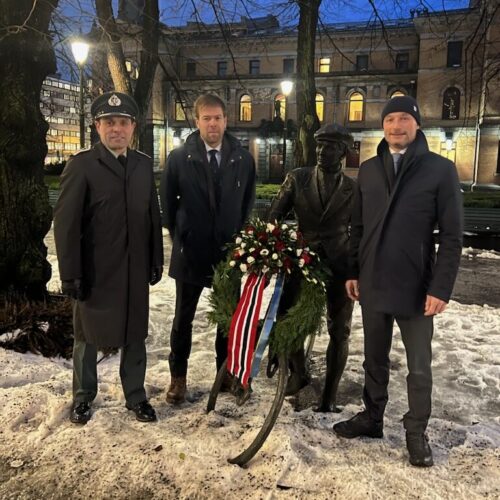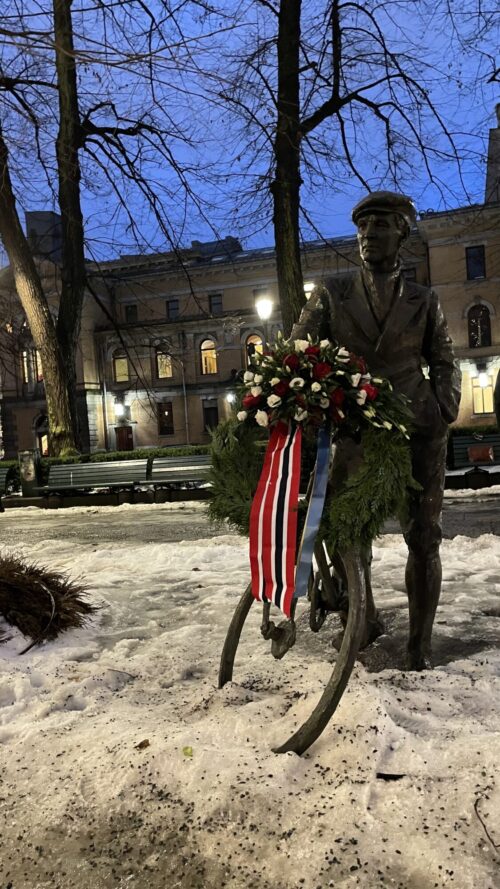
Gunnar Sønsteby’s life’s work was of a unique character. As a freedom fighter and community builder, he put in a formidable effort for the country in both times of peace and war. With a ballast of decorated courage and desire to live, he took every opportunity to be an advocate of the fundamental values of a democratic society.
In order to honour Gunnar Sønsteby’s life’s work, as well as help continue his important message, Gunnar Sønsteby’s Memorial Fund was established in 2013. As an important part of the memorial fund’s work, an annual prize is awarded in the name of Gunnar Sønsteby.
According to the statutes, the prize shall be awarded to “(…) the person or organisation which in action has emerged as a courageous defender of the fundamental values of our democracy, including keeping the will to defend alive and helping to ensure that our armed forces safeguard the freedom and independence of the country.”
The prize was first awarded in 2015, and last year the prize went to Roseslottet, a magnificent monument that, through art, conveys significant parts of our common cultural heritage, and which emphasizes the importance of us all standing up for our basic democratic values. This year the prize goes to NATO Secretary General Jens Stoltenberg.
Jens Stoltenberg
As NATO Secretary General for more than eight years, Jens Stoltenberg has demonstrated a commitment and leadership that is highly respected. In a very dramatic and unpredictable time for Europe and NATO, he has made a decisive contribution to keeping the Alliance together. His clear voice in the fight against the aggressive forces that threaten world peace has created results and given rise to hope.
NATO is a consensus organisation, where great demands are placed on the incumbent Secretary General. This function plays a key role in efforts to create understanding and agreement between the member states.
In the years since the Cold War, NATO has been through several demanding restructuring processes. First, from the Cold War to international operations, with closures and downsizing of national and international capabilities. Then in the war on terror, which presented new challenges, with Afghanistan as the most central. It was against this backdrop that Jens Stoltenberg agreed to become Secretary General in 2014. In February of the same year, NATO, through Russia’s annexation of Crimea, received a foreshadowing of Putin’s expansive ambitions. Two years later, NATO’s consensus principle was seriously challenged by the newly elected US President, Donald Trump.
In this extremely demanding situation, which was very important for NATO, and perhaps most of all for the Alliance’s smaller member states, Jens Stoltenberg managed to handle President Trump’s proposals in a way that did not threaten the Alliance’s basis for existence. Through his ability to handle the situation, he also managed to strengthen an organization that was under pressure from the leader of the Alliance’s most important country.
Jens Stoltenberg balanced and led NATO through the difficulties. Rightly so, these efforts attracted international attention. The Alliance’s Secretary General emerged as a unifying factor and has been a guarantor that the principle of consensus was maintained. As a result, NATO countries remain united. The Alliance’s relationship with the EU has also been harmonised during this period.
Since taking office as the Alliance’s leader, Stoltenberg has led the largest restructuring of NATO since the Cold War. In addition, he has led the effort and received approval for a new Strategic Concept for NATO.
At the same time as Jens Stoltenberg’s time as Secretary General was coming to an end, Russia attacked neighboring Ukraine. As Secretary General, he has held one of the world’s most demanding leadership roles for eight challenging years. He has now been appointed Head of Norges Bank, and his personal wishis to return home to Norway to take up this position.
But there is war in Europe, and the last thing NATO needs in such a situation is a change in leadership. The role of Secretary General becomes even more important, if possible, and the incumbent has already demonstrated his ability and willingness for stable and steady leadership. Jens Stoltenberg realizes that he cannot and will not let anything get in the way of what he sees as his most important duty. He sets aside personal wishes and accepts member states’ desire to continue as NATO Secretary General. He goes down in history as the second longest-serving Secretary General in NATO’s history.
The third extension meant that it fell on Jens Stoltenberg’s watch to support Ukraine in the country’s defense struggle as well as to secure the allies, especially those in the east, by deploying more forces and activating defense plans. Moreover, it became his task to lead the historic membership process for our neighbouring countries, Sweden and Finland. A process that is now in its final phase, and in which Jens Stoltenberg has needed his entire human and political register as leader.
Over the years, Jens Stoltenberg has emerged as an international leader of stature, during a time of a deeply serious and complex threat picture. In clear and concise terms, he has repeatedly hammered home that it is our freedom and our democracy that is at stake – that the outcome of Ukraine’s struggle for its country’s freedom is crucial for our own freedom and security.
He has also stated unequivocally that, for example, the energy crisis means that we in the Western world are paying a high price for solidarity with Ukraine, but that it is the Ukrainians themselves who, in terms of lost lives and a devastated country, are paying the highest price for the Russian aggression.
With ingenuity, commitment and demonstrated leadership, Jens Stoltenberg has made invaluable contributions to keeping NATO united at a critical time.
Gunnar Sønsteby’s Memorial Fund is an important cooperation partner for OSS Gjefsjøen and has made solid contributions to the project and work. OSS Gjefsjøen congratulate Jens Stoltenberg as a very worthy winner of the Sønsteby Prize 2023!

WW2 sabotage
Operasjon rype
In the last months of the war during spring 1945. Gjefsjøen Mountain Farm was a central location as part of the sabotage operation "Operasjon Rype". The saboteurs had their headquarter at the farm. Operasjon Rype's mission was to sabotage the railroad through Trøndelag and Snåsa. Today Home Guard's task force "Rype" is named after the operation.
Restoring of Operasjon Rype's headquarter
OSS Gjefsjøen
The building which was headquarter for Operation Rype was in bad shape after standing empty for years. OSS Gjefsjøen are now restoring the building. The association OSS Gjefsjøen will convey the story of Operasjon Rype which in the final phase of World War II operated from its base on Gjefsjøen mountain farm. The building will be restored in the original appearance from when Operasjon Rype was carried out.
Licour based on local herbs and plants from Gjefsjøen
Gjefsjøakevitt (Aquavit)
Distilled at Inderøy Brenneri (distillery) based on pure water, plants, herbs and botanicals from Gjefsjøen Mountain Farm. Made as a tribute to the heros from Operasjon Rype who had their base at Gjefsjøen in the end og World War II.